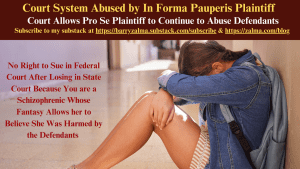Court System Abused by In Forma Pauperis Plaintiff

Refusing to Pay Policy Limits to Plaintiff not Fraud
Post 4905
See the full video at https://rumble.com/v5hg8z9-court-system-abused-by-in-forma-pauperis-plaintiff.html and at https://youtu.be/vRh_PmkoVQ0
Plaintiff Sonia C. Roberson, in pro se, was granted leave to proceed in forma pauperis (“IFP”) without paying filing fees. Her first attempt was dismissed by the court and the defendants were required to pay filing fees and attorneys fees to respond a second time.
In Sonia C. Roberson v. Rex Miller; Devera Miller; Agri Tech Business; Farmers Insurance, Civ. No. 6:23-cv-01243-AA, United States District Court, D. Oregon, Eugene Division (September 24, 2024) the court dealt with the amended complaint with charity and patience to the pro se plaintiff.
MOTION TO DISMISS
To survive a motion to dismiss under the federal pleading standards, the complaint must include a short and plain statement of the claim and contain sufficient factual matter, accepted as true, to state a claim for relief that is plausible on its face.
However, a Pro se pleadings are held to less stringent standards than pleadings by attorneys. The Pro se litigant is entitled to notice of the deficiencies in the complaint and the opportunity to amend, unless the complaint’s deficiencies cannot be cured by amendment.
DISCUSSION
In her Amended Complaint, Plaintiff seeks to bring claims against Rex Miller, DeVera Miller, Agri-Tech Business, and Farmers Insurance for multiple charges from insurance fraud to seeking criminal prosecution.
Background
Plaintiff’s Amended Complaint is 89 pages, mostly handwritten. The narrative presented is disjointed, repetitive, and difficult to follow. Plaintiff alleges that she was injured in a fall on the stairs to the residential unit and that she sued Rex Miller in Coos County Circuit Court for her injuries. Plaintiff was unsuccessful in that case, as she filed anDunsuccessful appeal with the Oregon Court of Appeals and tried her luck in federal court.
Plaintiff, in a telling admission that should have kept her be allowed as a pro se plaintiff when she alleges that she suffers from schizophrenia and that she is scared of Rex Miller “spying on me under the stairs and injuries ect!!!”
Farmers insured Millers and Agri-Tech for the property where Plaintiff lived. Plaintiff alleges she was offered $60,000 to settle the case on the eve of trial. Defendants also appear to have offered Plaintiff $100,000 to settle her claims that were not accepted and the jury returned a quick judgment in favor of the defendants.
Plaintiff, giving evidence of her claim of schizophrenia, alleges that Rex Miller “started criminal illegal acts and I believe he is illegally using his favoritism to spread discrimination plague disease of his illegal retaliation and jealousy.”
Preclusion
Throughout the Amended Complaint, there are repeated references to Rex Miller’s testimony during a civil trial, apparently concerning the injuries Plaintiff sustained while she was a tenant of the Millers’ property.
Preclusion is a legal rule that a plaintiff who has prosecuted one action against a defendant through to a final judgment is barred from prosecuting another action against the same defendant where the claim in the second action is one which is based on the same factual transaction that was at issue in the first, seeks a remedy additional or alternative to the one sought earlier, and is of such a nature as could have been joined in the first action.
Here, the Amended Complaint makes it clear that Plaintiff’s injuries arising from her time as a tenant of the Millers were fully litigated in a jury trial in the Coos County Circuit Court and that the jury returned a verdict in favor of the defendant.
The United States District Court, as a court of original jurisdiction, has no authority to review the final determinations of a state court in judicial proceedings.
FRAUD
Plaintiff appears to allege in her claim for fraud that Defendants offered to settle Plaintiff’s claims in the state court lawsuit for $60,000 or for $100,000, rather than the policy limit of $2 million. On its face, this is not fraud.
CRIMINAL CHARGES
Plaintiff is a private citizen and does not have standing to initiate criminal prosecutions of another person.
LEAVE TO AMEND
The Court previously afforded Plaintiff leave to amend her complaint and in consideration of Plaintiff’s status as a self-represented party, the Court, as an expression of empathy, provided her one more opportunity to amend her complaint and warned her of repetition on the findings of the opinion. The Defendants must, therefore, pay to defend her third try to state a cause of action.
The Amended Complaint was DISMISSED with leave to amend.
Litigation is a privilege but it is not a privilege without limits. The plaintiff, by continuing to sue the defendants with the court allowing her to file a third complaint after losing in state court and suing the same defendants in federal court gets her win by forcing them to pay to defend a spurious action. The schizophrenic in as a pauper files an almost 90 page handwritten complaint that was almost impossible for the court to decipher, resulted in a dismissal and leave to amend leaving the defendants with excessive costs trying to understand her meandering through legal principals only to obtain a Pyrrhic victory so they can go through the exercise once again. This is an abuse of the legal system giving an allegedly “poor” person more rights that the defendants. To paraphrase George Orwell in “Animal Farm” all litigants are equal but some are more equal than others.
 (c) 2024 Barry Zalma & ClaimSchool, Inc.
(c) 2024 Barry Zalma & ClaimSchool, Inc.
Please tell your friends and colleagues about this blog and the videos and let them subscribe to the blog and the videos.
Subscribe to my substack at https://barryzalma.substack.com/subscribe
Go to X @bzalma; Go to Newsbreak.com https://www.newsbreak.com/@c/1653419?s=01; Go to Barry Zalma videos at Rumble.com at https://rumble.com/account/content?type=all; Go to Barry Zalma on YouTube- https://www.youtube.com/channel/UCysiZklEtxZsSF9DfC0Expg
Go to the Insurance Claims Library – https://lnkd.in/gwEYk
Like this:
Loading…



